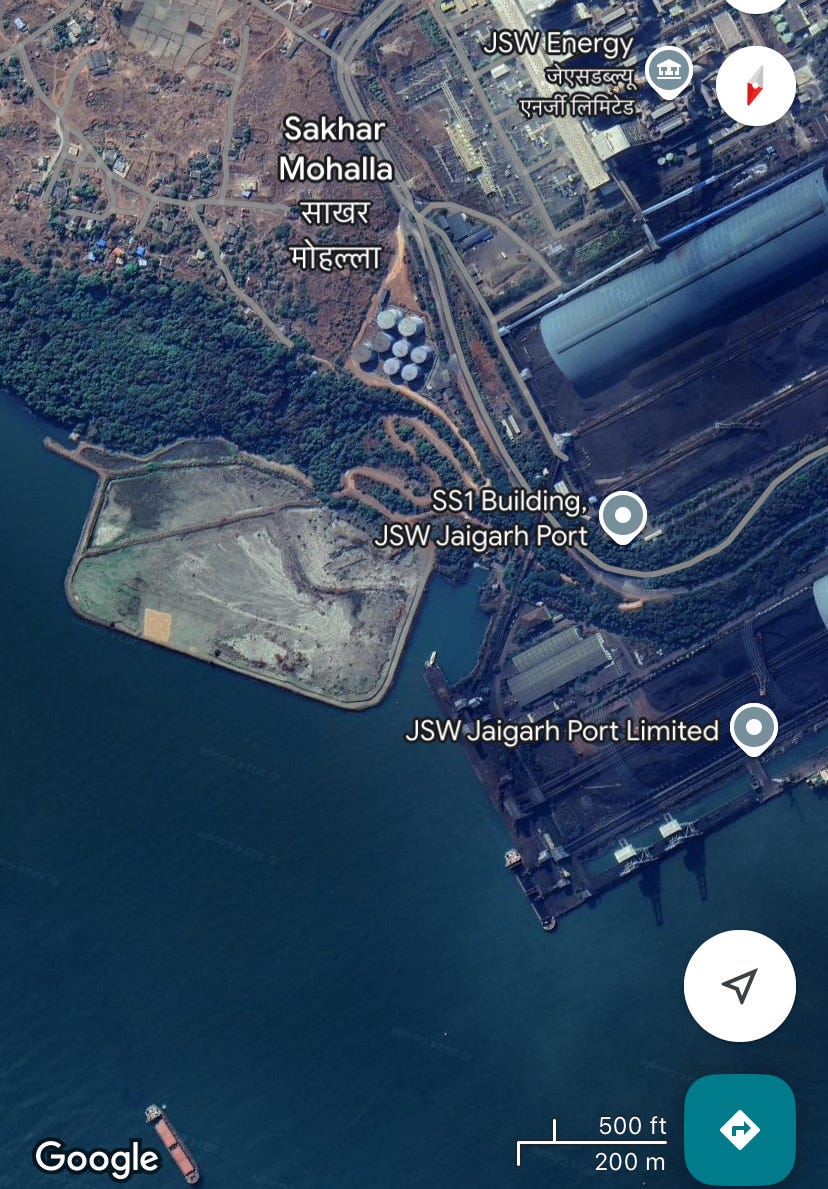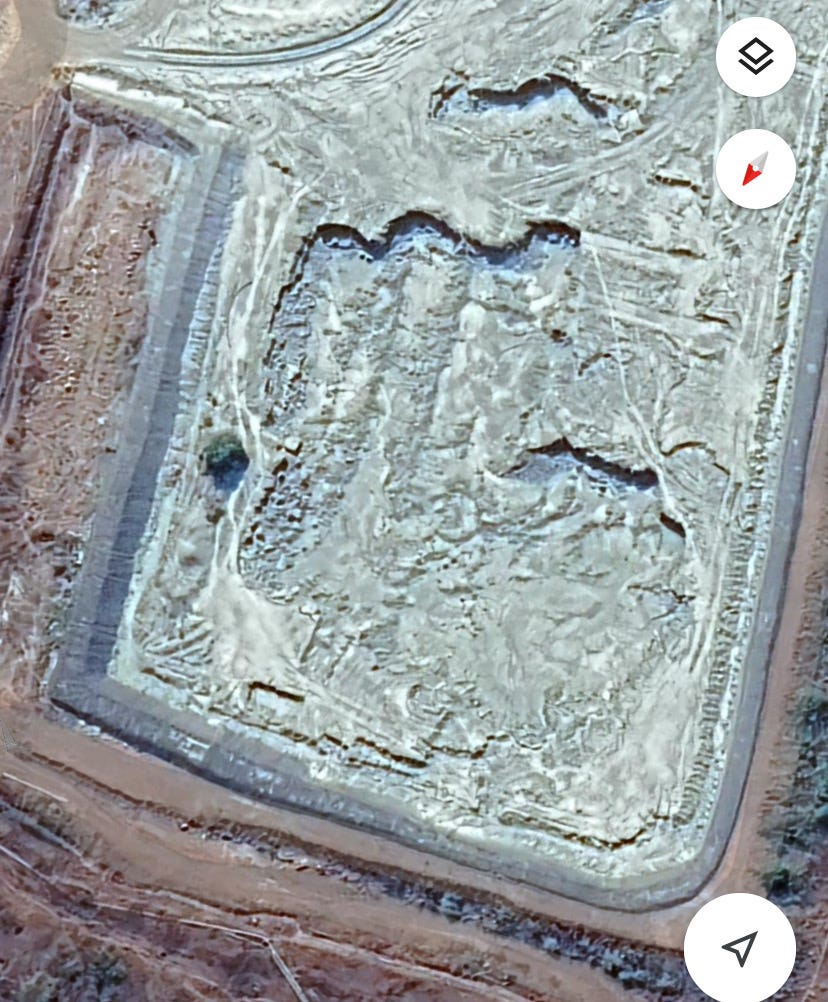Satish Kamat, a senior journalist and a fellow Konkani has joined me for the day. As we walk down the road, we can’t help but notice the claws of this humongous company extending further and further, enveloping the surrounding villages, its hunger, endless. These two mighty towers of Jindal power, have stood here for over two decades. Like the stork bird, which stands quietly on its one leg until it sees its prey, these towers too have stood in quiet. They have digested many good and bad events. The temple of Karhateshwar, hides on one side. When greed had tempted the villagers to sell off most of this land, faith left a tiny spot of this heaven open for the people to enjoy the natural beauty of this place. To sit in quiet and watch this natural beauty turn into a modern man’s concrete dream, is all that this temple can do now. In the past decade, it has seen a tail-like structure grow steadily by conquering the sea, now acting as a permanent barrier in what was once an endless view of the Arabian sea.
“Development” is what was guaranteed to the locals. They had accepted the sweet words of the company. That we bring you progress. That this bareen land will now turn bountiful. But, now after almost 3 decades, those sweet words have lost their taste, they have turned bitter. What was labelled as green energy, turned out to be an endless repository of coal. Ships dock this port supplying coal from far off lands. Villagers, who once owned these very lands where the coal now sits, now work as security guards and workers who pick the coal which is fallen off from the conveyer belts.
We saw many women from nearby villages, walking a few kilometres to the factory and back. They work there as sweepers and cleaners— what a mark of organic growth! As we walked, many water tankers ran past us, supplying water to a water rich village called Nandivade. Something felt amiss, but we couldn’t point what it was. Only a few weeks back, a gas leak from the Jindal power plant had admitted many school kids in a hospital. Many theories were passed, but in the end, some people and newspapers went so far to save the company, that they wrote, “the gas was leaked within the chemistry lab, in the school itself.” Such is the level to which things are controlled/managed here. After a few weeks, no one is willing to speak and everyone who speaks, somehow goes quiet.
When we met Damle kaka, we felt that he had accepted his fate. He was waiting for the time when things get so out of hand, that he will be forced to move out. Many generations of his family have lived in Nandivade. His occupation, mango production, has had a massive hit in the past decade. His production has seen a decline by 2/3 in the past decade. When Jindal was coming into existence, his father and Prof. Bhide, were amongst the few people who fought for the future of this land. They were rightfully concerned about the environmental impacts of this project. Obviously, they were dismissed by the leaders back then. But their concerns now make sense. The entire coastline is marred with oil leaks. Crops have a reduced yield and water, although ample, is useless.
This has been a common case. During the land acquisition, no one is told what project or industry is about to arrive here. People who are close to the government authorities and ministers, know about the land where projects are about to spring up. They buy the land in advance, convincing people that they are only going to plant mangoes and cashews, but this is a front. After a few years, when enough land is acquired, people get to know about the real reason behind this acquisition. By then they are landless and voiceless.
Most of the wells in this water-rich Nandivade, now contain undrinkable water. Water tankers are provided by the company, so that the people stay put. The years of waste burial, of ash and other residue, and its seepage into the ground water sources, have turned the water bitter/acidic.
Manoj kaka took us to a nearby field. “Look at this,” he said, rubbing his finger on a banana leaf. His fingers had a layer of black dust. This was not dust from the roadside, this was a mixture of coal and ash. The floors in each house have impression of peoples feet. Each morning when they wake up, they spent the early hours to get rid of this dusty coal. With sea wind, this coal stored in open on the company docks spreads to the nearby villages, damaging the local flora and fauna. Yet, no one cares. The company and the governmental authorities/pollution control board definitely don’t. People are tired. Raja Doctor, a local doctor who has fought a case against this for many years, travelling to and fro to Mumbai to work on it, is now tired. What happens when no one cares for the inhabitants of the land? You realise that this so-called development wasn’t for you, it was to exploit the resource-rich land and sea, by driving the locals out of their land.
In Damle kaka’s backyard, fields were filled with overgrown weed. A gas pipeline that runs through the centre had dammed the fields, stopping farmers from taking any crop. A once farming rich land, had now turned barren due to such negligence.
Are we, as citizens of this country, even allowed to ask what kind of projects are coming to our land? What should we do if our land is acquired by using money and power? The police too beat up villagers who try to rightfully protest against this injustice.. What rights do we have left in this process? Should we all simply sit back, get depressed, accept our fate and let them rape the land once and for all? What options do we have when most of the land is lost in the name of company-based “green” CSR projects. These mango plantations, only a front until people get bored/tired and the next generation has forgotten the old promises. The CSR-land, now ready to be exploited afresh, anew!
I know, the urban mind thinks that these projects are good, but does that mind have answers to the problems that these villagers are facing?
Thank you for the help provided so far and for being a part of this walk! I now have a team assisting me and if financial support can be provided to keep them going, then please do so. here’s the link
For Indians who want to support'/contribute, here is the UPI payment number GPay or PhonePe- 8983726737
The idea of this walk is to highlight the issues, spread an ecological conscience within the people, listen to them and bring them together to see if we can bring about a change that can move towards a future that aids people rather than pushes them away from their homeland.
If you can help me by contributing for this walk, then please do, I could start a kickstarter or manage crowdfunding through some other website, but none of those options are available to me here in India. So, I will be dependant on your donations. You can contribute through paypal - here’s the link. I will send out a personalised postcard if the donations are above $30 and if it’s above $100 then whatever comes out of this walk - a book, a documentary or anything else - you will be the first ones to receive it.










